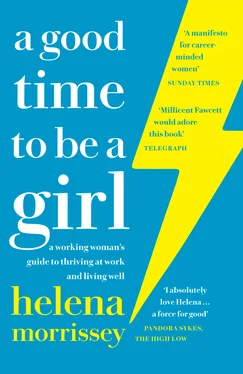Young women sometimes say it is easy for me, with Richard’s support, a relatively high salary and greater flexibility with my time than someone starting out. I always stress that while I’m very aware of these advantages, they haven’t always been there. Struggles have been part of not just my journey but most people’s too; it’s almost inevitable that any successful person has had their share of failures. When Richard and I hit our low point of financial stress, my mother reminded me that nothing lasts for ever, and that helped me to focus on finding a solution rather than be dragged down by anxiety. The experience again made me realise that I could not rely too much on others but needed to take control of my own destiny as far as possible. We will return to these big topics later; for now, let me emphasise the importance of recognising that each of our lives is different, but there are things we can do that will make the most of a situation – or shrink our opportunities. Whether you have a partner or not, you need a few strong allies, friends, mentors: people you can really confide in, who will give you good advice. Ultimately we have to make our own decisions, but no person is an island and none of us has an unlimited well of confidence, or all the answers.
I was once interviewed on live TV about workplace equality and the (female) presenter kept challenging me on one point: surely, she argued, it must be possible for both partners to have ‘high-powered’ careers with children? It was slightly perplexing that she kept returning to the topic, but as I walked off set, the producer explained that my interviewer was getting married very soon. Apparently, she and her fiancé were struggling with the idea that one of them might need to be less focused on their career once they started a family. Both saw that as a potential career setback or even a death knell – and the woman was particularly worried because she could see it would be more likely to be her, not her future husband, stepping back. Looking ahead, I am confident that more people (not just women) will be able to take advantage of more fluid ways of working, to ‘dial up’ or ‘dial down’ their careers from time to time – and so feel less concerned about making a binary choice. As life expectancy increases, we will need to work longer and may have two or three careers (this may be forced upon us, as employment opportunities change along with the rise of artificial intelligence). Taking a few years off in the middle, or changing the pace for a while, should really make little difference overall. ‘Returnships’ – the opportunity to return to a meaningful role after a gap of several years – are likely to become increasingly prevalent and part of a big shake-up in employment patterns.
For all the discussion about women and our changing role in society, there tends to be little focus on what this means for men. Richard has always maintained that the logical extension of all the efforts to help women fulfil their career potential is for men to have more choices too. Gender equality cuts both ways and redefining what success means for all of us is part of what we need to do. There are, today, still quite straitjacketed expectations about what it is to be a successful man. As he made the transition to full-time parent, Richard became frustrated by the question ‘What do you do?’ – it was so clear that men are largely defined by their job. His honest answer would leave people hesitating about what to say next and they often seemed embarrassed. So he experimented with various ways of explaining his role, including referring to his other interests, such as painting, meditation and spiritual healing. We are still a long way from the point where having a stay-at-home father is seen as just as normal for families as a stay-at-home mother. (Or where a man can praise his wife for being a wonderful stay-at-home mother just as I can praise Richard today.)
Those factors that made all the difference to my career – self-awareness, meritocracy, and a supportive partner – are, I believe, very relevant to young, ambitious women – and men – today. My story is not a template, however. There is now much greater scope to be different and to influence your own path than there was thirty, twenty or even ten years ago. Women of my age (or a decade older or younger) in senior roles today are the exception, not the norm. We have been allowed into a masculine club at the top of business or politics. I think of us as a ‘transition’ generation, benefiting from the work that so many generations of women did before us, but still needing to mostly fit in with the status quo. Young people have different challenges, with uncertainty over employment prospects affecting both boys and girls. But they also have a greater opportunity to bring their differences into the workplace right from the start, to help create paths towards new thinking, new solutions to today’s challenges, not more of the same.
Chapter 2
We can’t solve problems with the same kind of thinking we used when we created them.
ALBERT EINSTEIN
While my career had been progressing well at Newton, the opportunity to become chief executive just seven years after joining was unexpected – most of all by me. The takeover of the firm by Mellon Bank, an American company, had been long planned and took several years to complete. It seemed probable that some members of the management team might decide to move on. As part of the four-strong Investment Strategy group, I was a potential candidate for the role of chief investment officer (CIO). I was keen to get the job if it became available – I loved making the big strategic investment calls, enjoyed life at Newton and got on well with my colleagues. I was feeling restricted by my existing role: at the time, one piece of US economic data was driving bond markets around the world – the employment figures released the first Friday of each month. My whole working life revolved around this data point. In particular, one long weekend sticks in my memory. My husband and I had taken our children to visit their grandparents and instead of enjoying our family time I was glued to the news. The data was much stronger than anticipated, my positioning was all wrong and I felt distraught, helpless and rubbish at my job. This was obviously an overreaction, and as Richard and I discussed my loss of perspective, it was clear that I needed a new, broader challenge.
So I was delighted when Mellon’s UK-based chief offered me the CIO role, which offered the opportunity to lead a talented team, as well as to expand my horizons. My new boss told me that he would fill the other vacancy himself, adding the Newton CEO position to his responsibilities. Next morning, one of my colleagues stopped by my desk and quietly mentioned that the other senior investors had met and unfortunately they didn’t want me to become the CIO. Taken aback, having thought I had their support, I asked if they would meet me to explain why. As we went into the room, I mentally ran through my options, realising that I would probably have to leave, given what seemed (to me) to be a vote of no confidence.
It turned out that my colleagues thought, reasonably, that it was important for the CIO to have an equities background since most of the firm’s assets were invested in the stock market. The conversation turned to my leadership skills, and there it was clear that I did have a following. Before I knew it, the suggestion was being made that I become the chief executive officer instead.
My first reaction was a sense of relief. I loved working at Newton and didn’t want to leave. I also knew this meant that it was in relation to the specific role that my ability was in doubt rather than an objection to me as a person. At the same time, I was disoriented by what had just happened. We all left the room and I ducked into an adjacent one and gathered my thoughts. I called my husband and told him ‘I’m not going to be the CIO any more, I’m going to be the CEO.’ ‘What does that entail?’ he asked and I answered, truthfully, ‘I have no idea.’ What I did know was that I believed in what Newton had to offer our clients, in the team and the process, that I could lead and that this was an unusual, perhaps once-in-a-lifetime opportunity.
Читать дальше



![Scott O’Hara - Five-Star Fugitive [= Border Town Girl]](/books/432138/scott-o-hara-five-thumb.webp)








